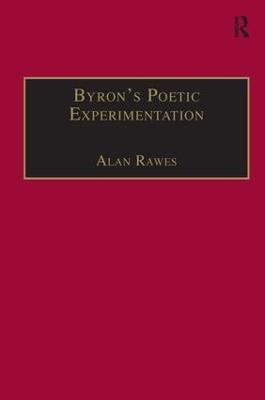The Nineteenth Century
1 total work
In this study, the author examines the evolution of Byron's poetry from Childe Harold I and II through to the composition of Beppo. Beginning with a close reading of the sustained poetic experimentation that constitutes Childe Harold I and II, he charts the progress of that experimentation in the Tales where Byron's poetry gets entrenched in a tragic idiom. The author then describes Byron's prolonged struggle to break clear of the imaginative limitations imposed by that tragic idiom and to break into a sustainable comic mode: a struggle that drives Childe Harold III, The Prisoner of Chillon, and The Dream only to culminate in success in Childe Harold IV. It is here, as Rawes demonstrates, that the path forward into the comic mode of Beppo and Don Juan is discovered. Byron's Poetic Experimentation also offers a substantial reconsideration of Byron's shifting attitude towards Wordsworthian idealism and a detailed analysis of the structured eclecticism of Manfred.
